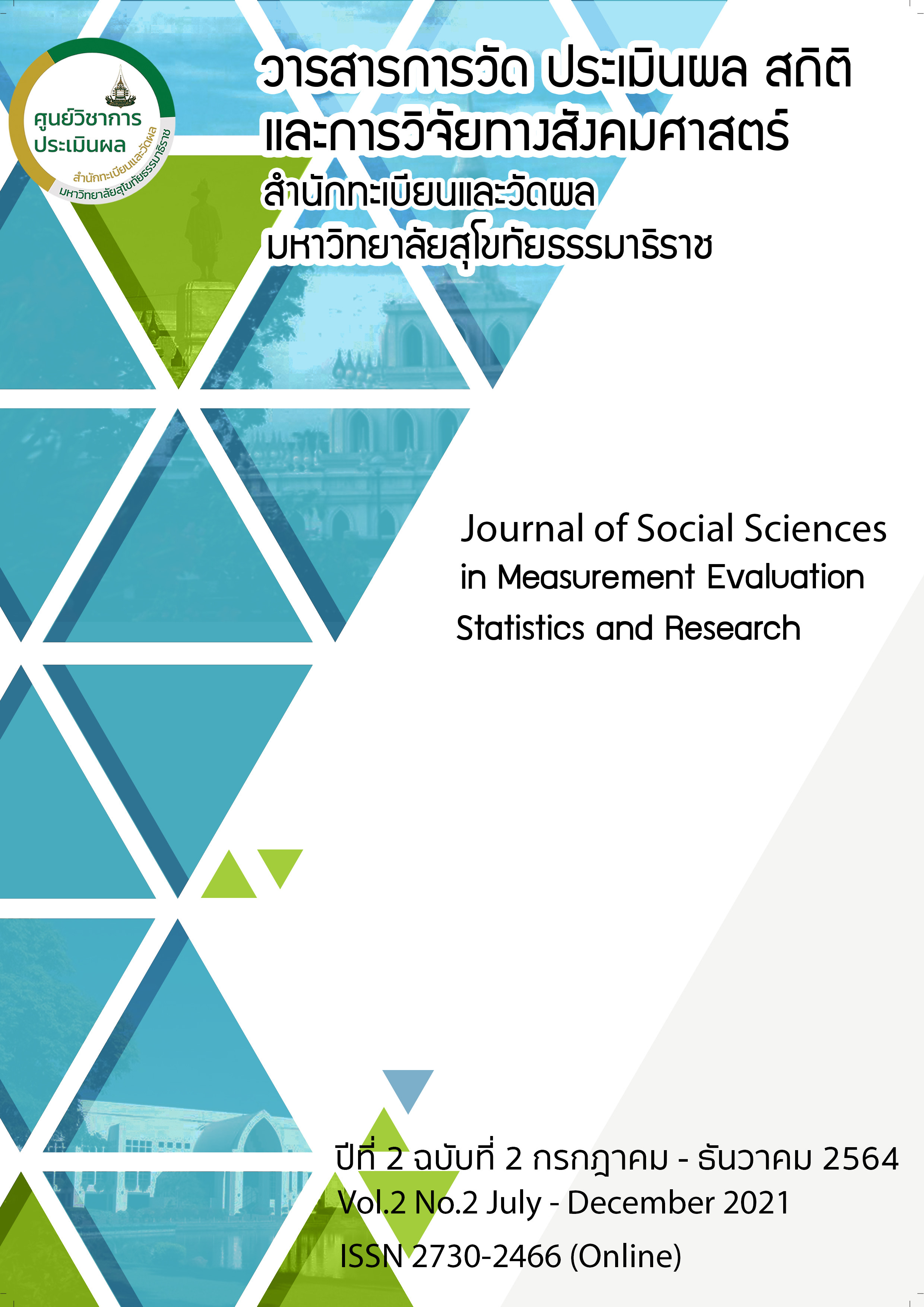การวิเคราะห์พฤติกรรมการเรียนรู้ในหลักสูตรออนไลน์ระบบเปิด : การประยุกต์ใช้การเรียนรู้ด้วยเครื่องและการเรียนรู้เชิงลึก
Main Article Content
บทคัดย่อ
การเติบโตของหลักสูตรออนไลน์ระบบเปิดพัฒนาขึ้นอย่างรวดเร็วทำให้ปริมาณและความหลากหลายของข้อมูลเพิ่มขึ้นอย่างรวดเร็ว ข้อมูลขนาดใหญ่ได้เริ่มแสดงให้เห็นคุณและความสำคัญในการศึกษาทางไกล บทความนี้เสนอข้อมูลใน 5 ส่วน ส่วนแรก นำเสนอปัญหาที่เกิดขึ้นกับหลักสูตรออนไลน์ระบบเปิด ส่วนที่ 2 นำเสนอแนวคิดของการเรียนรู้ด้วยเครื่องและการจัดประเภทของวิธีการเรียนรู้ ส่วนที่ 3 นำเสนอแนวคิดของการเรียนรู้เชิงลึกที่เกี่ยวข้องกับพฤติกรรมการเรียนรู้ในหลักสูตรออนไลน์แบบเปิด ส่วนที่ 4 นำเสนอวิธีการนำการเรียนรู้เชิงลึกมาใช้ทำนายผลการเรียนรู้จากพฤติกรรมผู้เรียน และส่วนที่ 5 บทสรุป
Article Details
ข้อความและบทความในวารสารการวัด ประเมินผล สถิติ และการวิจัยทางสังคมศาสตร์ เป็นแนวคิดของผู้เขียน มิใช่ความคิดเห็นของกองบรรณาธิการวารสาร จึงมิใช่ความรับผิดชอบของวารสารการวัด ประเมินผล สถิติ และการวิจัยทางสังคมศาสตร์ บทความในวารสารต้องไม่เคยตีพิมพ์ที่ใดมาก่อน และสงวนสิทธิ์ตามกฎหมายไทย การจะนำไปเผยแพร่ ต้องได้รับอนุญาตเป็นลายลักษณ์อักษรจากกองบรรณาธิการ
เอกสารอ้างอิง
Del Vento, D., & Fanfarillo, A. (2019). Traps, pitfalls and misconceptions of machine learning applied to scientific disciplines. Pearc '19 Proceedings of The Practice And Experience In Advanced Research Computing on Rise of The Machines, 75. doi:10.1145/3332186.3332209
El Naqa, I., & Murphy, M. J. (2015). What is machine learning? in I. El Naqa, R. Li, & M. J. Murphy (Eds.), Machine Learning in Radiation Oncology: Theory and Applications (pp. 3-11). Cham: Springer International Publishing.
El Said, G. R. (2017). Understanding how learners use massive open online courses and why they drop out: thematic analysis of an interview study in a developing country. Journal of Educational Computing Research, 55(5), 724-752. doi:10.1177/0735633116681302
Henderikx, M. A., Kreijns, K., & Kalz, M. (2017). Refining success and dropout in massive open online courses based on the intention–behavior gap. Distance Education, 38(3), 353-368. doi:10.1080/01587919.2017.1369006
Hollands, F. M., & Tirthali, D. (2014). MOOCs: Expectations and reality. Full Report. Retrieved from http://files.eric.ed.gov/fulltext/ED547237.pdf
Huang, N., Chen, C., Tzeng, J., Fang, T. T., & Lee, C. (2018, 26-28 Sept. 2018). Concept assessment system integrated with a knowledge map using deep learning. Paper presented at the 2018 Learning With MOOCS (LWMOOCS).
Kim, J., Guo, P. J., Seaton, D. T., Mitros, P., Gajos, K. Z., & Miller, R. C. (2014). Understanding in-video dropouts and interaction peaks inonline lecture videos. Paper presented at the Proceedings of the First ACM Conference on Learning @ scale conference, Atlanta, Georgia, USA. https://doi.org/10.1145/2556325.2566237
Lee, C.-A., Tzeng, J.-W., Huang, N.-F., & Su, Y.-S. (2021). Prediction of student performance in massive open online courses using deep learning system based on learning behaviors. Educational Technology & Society, 24(3), 130-146. Retrieved from https://www.jstor.org/stable/27032861
Lee, Y. (2018). Effect of uninterrupted time-on-task on students’ success in Massive Open Online Courses (MOOCs). Computers in Human Behavior, 86, 174-180. doi:https://doi.org/10.1016/j.chb.2018.04.043
Lee, Y., & Choi, J. (2011). A review of online course dropout research: implications for practice and future research. Educational Technology Research and Development, 59(5), 593-618. doi:10.1007/s11423-010-9177-y
Shah, D. (2020). Analysis by the numbers: MOOCs in 2020. Retrieved from https://www.class-central.com/report/mooc-stats-2020/
Wang, W., Yu, H., & Miao, C. (2017). Deep model for dropout prediction in MOOCs. Paper presented at the Proceedings of the 2nd International Conference on Crowd Science and Engineering, Beijing, China. https://doi.org/10.1145/3126973.3126990


